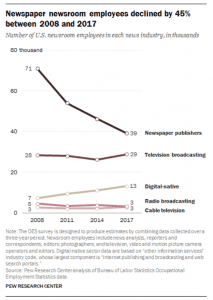Dominique McKay graduated from Liberty University as a journalism major in 2009. Her timing couldn’t have been worse. Newsroom jobs were disappearing; in nine years, they’d decline by 45 percent.
“When I left college, there were no jobs in journalism,” she said. “I ended up going back to school for a master’s in communication, mostly to wait out the job market and see what would be available when I got out later.”
 Not much. After graduating with a master’s degree in communication from Liberty in 2012, McKay applied for 50 positions in and around Washington, D.C.—just a few hours from family. When nothing panned out, she thought about giving up.
Not much. After graduating with a master’s degree in communication from Liberty in 2012, McKay applied for 50 positions in and around Washington, D.C.—just a few hours from family. When nothing panned out, she thought about giving up.
“I planned to take a break and try again in the summer,” McKay said. “But then I thought, Oh, I’m just going to apply for one more. It was an unpaid internship on Capitol Hill.”
It wasn’t glamorous—the interns sort the mail, answer telephones, and process American flag requests from constituents. But McKay got the job.
Seven years later, she’s the press secretary to Senate Majority Whip John Thune of South Dakota, the No. 2 Republican senator in Washington, D.C. She also serves on the leadership board for the women of McLean Presbyterian Church. In both positions, she’s constantly giving the same reminder: You aren’t here for you. You’re here for Jesus.
TGC asked McKay about her work on the Hill, the pressures she feels as a Christian, and how her church ministers to ambitious women.
How did you move from intern to press secretary for the senate majority whip?
I followed my first internship on the Hill with one at a D.C. newspaper called Roll Call, but my first week I got offered a job as a staff assistant for [Republican] Senator James Inhofe of Oklahoma. Accepting the job was a difficult decision because I loved journalism, but I needed a full-time job and it was a great opportunity, so I took it.
While working there, I was promoted to doing more writing—mostly letters to constituents. I wrote about health care, education, and labor issues, and I met regularly with advocates for those issue areas. I became an expert on those topics for the senator. Because of that, when I left after three years to work for the House Committee on Education and the Workforce, it was an easy transition.

I was deputy press secretary for the House Committee and enjoyed the work I did there. One of my career highlights was working with the team that helped put together and pass the Every Student Succeeds Act in 2015 (legislation that modified No Child Left Behind, moving more responsibility to the states). When giving career advice to other staffers on the Hill, I always recommend they try and get a job working for a committee, because committee work is the bulk of what Congress does, and it is so rewarding.
A couple of years later, I left to work for Senator Thune, my current boss. I started with his team working for what’s called the Senate Republican Conference—it’s essentially like a PR office for Republican communicators in the Senate. I served as Senator Thune’s press secretary, helping Republican senators and their staffers message on whatever the legislative agenda was at any point in time. It was a great opportunity and a great honor to work there.
Then recently Senator Thune moved into a new leadership position. In January, he became the Senate’s majority whip. I transitioned with him into the Capitol to continue serving as his national press secretary.
What do you do all day?
Usually my day starts with sending out alerts to the press about what will happen on the Senate floor that day. I also respond to press inquiries, assist the senator with various events and meetings, pitch television appearances, and prepare memos and other messaging materials for him.
Our communications team also still advises other Republican communicators. They’ll ask, “What is your boss saying about this?” or “How should we talk about that?” and we give them guidance.
We do a lot of media monitoring. We’re always watching the news and always reading Twitter. The great thing about Twitter is you can get a lot of information quickly, and you can get your messages out quickly. We also track what’s going on among members, so we always have a window into where Republicans stand on different issues and what the media is saying about them.
It’s interesting—there’s never a dull day. It can be stressful, but I think how you handle the stress all depends on your perspective.
So what’s your perspective?
When you grow up in a Christian home and come out of a Christian college, you have to decide at some point whether or not you’re going to be public with your faith as an adult. As I went along pursuing my career path, I chose to be a Christian publicly.
It’s a little easier to talk about faith when you’re in more politically conservative circles, because while they may not be Christians, they are familiar with many of the aspects of the Christian faith. But even then, it becomes more challenging as you get older, because people start to distance themselves from their childhood faith or the faith of their parents. That’s when—regardless of their backgrounds—people often grow more hostile to the faith.
You have to decide at some point whether or not you’re going to be public with your faith as an adult.
For me, if anything, I’m more of a devoted Christian than I was when I was younger. In a sense, God prepared me as I went along to be able to remain in the faith and remain at the same level of intensity in talking about the faith. God’s faithfulness to me in that regard continues to shape my day-to-day life and helps sustain me in my current career.
How does your faith affect your work?
There are a lot of challenges working on the Hill. We experience conflict and the national spotlight pretty much every day. But my primary focus is the relationships I have with coworkers, reporters, and other communicators.

Most people who work in this field are here because of their ambition. Across the board, whether Democrats or Republicans—they’re ambitious.
A large number of people come to D.C. to make a positive difference, but they get here because of that ambitious spirit. That kind of ambition can lead people to do things they shouldn’t be doing. A lot of people aren’t able to see right from wrong when their sole mission is to succeed. One of the things I bring to the environment is the fact that, as a Christian, it is not my mission to succeed or advance. It’s my mission to be faithful. That’s pretty rare.
Obviously, no one is saying, “Well, I’m here just for myself.” But when you start to ask people probing questions, I think a lot of them start to realize that underneath it all, they are here pursuing a bit of selfish ambition. And when you start to challenge them about that, they start to think, I could have a life that’s not just about me. You can begin to change their perspectives.
The truth is, to be driven is not a bad thing. Many cities attract people who are this way. The fact that people would step out of their communities and do something—such as come to the city on their own—is actually a great thing. They’re thinking differently, thinking outside the box—those are natural leaders.
It is not my mission to succeed or advance. It’s my mission to be faithful.
But you have to have Christ in that. A major way Christians can be influential on the Hill is really taking down some of those smokescreens—revealing things in people that they didn’t know were there.
To be able to influence natural-born leaders and shift their goals, their perspectives, their ultimate mission, is really a good thing. People in D.C. are different, but I don’t see it as a negative. Their ambition is something that can be channeled for good.
How does God care about politics?
We’re here on earth to make things better—as best we can. That includes all realms of industries and vocations. Politics isn’t excluded. Some Christians don’t feel the need to get involved in politics, and I think it’s because here in America there are a lot of Christians who have comfortable lives and don’t experience any type of systemic suffering. They don’t see why there is a need for Christians to be active in changing society or making it better. They’re the type of Christians who have fallen in love with this world and their lives here. There is a need to provoke those kinds of Christians into seeing, “Oh, we’re here on mission, not just to live a comfortable life and build homes and families.”
It’s because of the retreat of people of faith from the political realm that we lack moral leadership. Your government is a result and a reflection of the people in your society. If you want it to be different, you have to be involved.
Other Christians don’t want to get involved in politics because they don’t see a moral party or a group that is really doing the right thing. They say, “Everyone is corrupt. I don’t want to get involved.” But it’s because of the retreat of people of faith from the political realm that we lack moral leadership. Your government is a result and a reflection of the people in your society. If you want it to be different, you have to be involved.
Is it hard to keep a moral center?
That is a challenge. As with any field, it becomes more of a challenge the higher up you move. As the stakes get higher, you feel an intense amount of pressure to do the wrong thing to stay in power or keep advancing.

When I first started on the Hill, I was not aware of that kind of intensity and that type of experience. I didn’t understand when people would talk about this. But as you advance there is a lot of pressure to just go along with whatever is happening or to look the other way. For some people it’s internal pressure, and for others it’s external. Sometimes it’s both.
For me, one of the things that helps is that my whole life I was a military kid and a minority, so I was always slightly on the outside. As you’re growing up, that’s not fun or cool. That’s uncomfortable. But now that I’m in leadership roles, the pressure is on and intense and real. I realize that being slightly on the outside is where I always belonged. God prepared me to not need to be on the inside or have everyone like me. I don’t have to go along so I can remain on the inside. Realizing that gives me more confidence to be faithful, even if that means remaining slightly on the outside.
I realize as time goes on how intricately God uses every aspect of your life to prepare you for the exact thing you’re going to be doing.
Tell me about your church.
One of our main focuses at McLean Presbyterian Church is Bible education—educating ourselves about faith so we’re prepared to use it in our communities and in the workplace.
I work with the women’s ministry at the church. Our women here are from all walks of life and very educated—many of them either have or had high-profile, intense-pressure jobs. Even for those who have retired or are staying at home with kids, many still experience that same restlessness and ambitious energy to always be moving forward. It’s a unique community.
We’re doing a couple of things to minister to those needs. One, we talk a lot about how your work ethic can be used in your faith life. Two, we’re beginning to focus more on mission ministries to people in our communities, specifically women who maybe are single moms or struggling financially. Not only is it a ministry to people in our community but also to our church, because it helps demonstrate to our women the importance of being others-focused.
I try to press upon the community that we are here on mission for Christ. So regardless of what stage of life you’re in, that is still the focus. A lot of it is helping them to find contentment in where they are: Look at your stage of life and put your whole heart into ministering to your community in that stage. People can always be looking to future—“What else is out there? What’s next?” Well, actually, this is where you’re supposed to be. Put 100 percent into the life you have now.
Involved in Women’s Ministry? Add This to Your Discipleship Tool Kit.
 We need one another. Yet we don’t always know how to develop deep relationships to help us grow in the Christian life. Younger believers benefit from the guidance and wisdom of more mature saints as their faith deepens. But too often, potential mentors lack clarity and training on how to engage in discipling those they can influence.
We need one another. Yet we don’t always know how to develop deep relationships to help us grow in the Christian life. Younger believers benefit from the guidance and wisdom of more mature saints as their faith deepens. But too often, potential mentors lack clarity and training on how to engage in discipling those they can influence.
Whether you’re longing to find a spiritual mentor or hoping to serve as a guide for someone else, we have a FREE resource to encourage and equip you. In Growing Together: Taking Mentoring Beyond Small Talk and Prayer Requests, Melissa Kruger, TGC’s vice president of discipleship programming, offers encouraging lessons to guide conversations that promote spiritual growth in both the mentee and mentor.

































